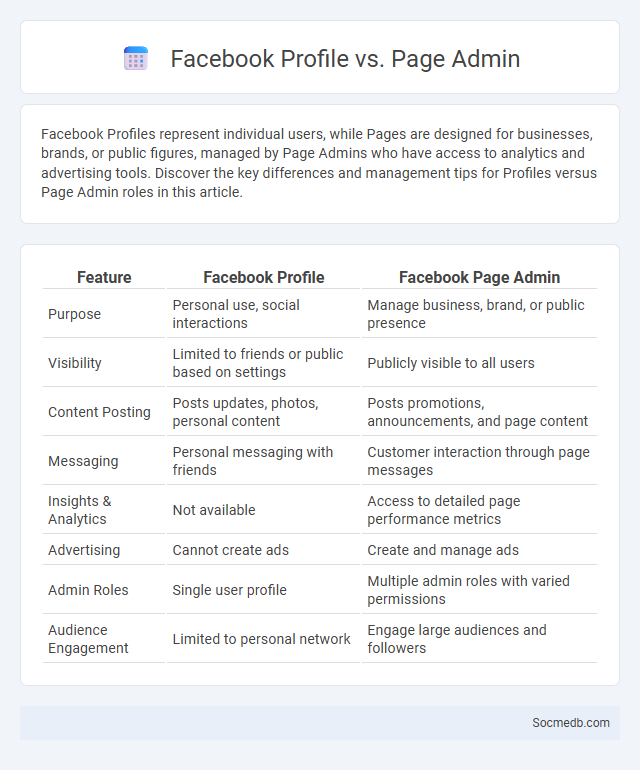
Photo illustration: Facebook Profile vs Page Admin
Facebook Profiles represent individual users, while Pages are designed for businesses, brands, or public figures, managed by Page Admins who have access to analytics and advertising tools. Discover the key differences and management tips for Profiles versus Page Admin roles in this article.
Table of Comparison
| Feature | Facebook Profile | Facebook Page Admin |
|---|---|---|
| Purpose | Personal use, social interactions | Manage business, brand, or public presence |
| Visibility | Limited to friends or public based on settings | Publicly visible to all users |
| Content Posting | Posts updates, photos, personal content | Posts promotions, announcements, and page content |
| Messaging | Personal messaging with friends | Customer interaction through page messages |
| Insights & Analytics | Not available | Access to detailed page performance metrics |
| Advertising | Cannot create ads | Create and manage ads |
| Admin Roles | Single user profile | Multiple admin roles with varied permissions |
| Audience Engagement | Limited to personal network | Engage large audiences and followers |
Understanding Facebook Profiles: Personal Use Defined
Facebook profiles serve as your personal online identity, reflecting your interests, photos, friends, and activities. They allow you to connect with others, share updates, and express yourself within a controlled privacy setting. Understanding how to manage profile settings ensures your personal information is shared according to your preferences and enhances your social media experience.
What is a Facebook Page Admin?
A Facebook Page Admin is a user with full control over a Facebook Page, responsible for managing content, moderating interactions, and adjusting page settings. Admins can create posts, respond to comments, access page insights, and assign roles to other users to help manage the page effectively. This role is essential for businesses and public figures aiming to maintain a consistent brand presence and engage with their audience on Facebook.
Key Features of Facebook Profiles vs Pages
Facebook Profiles allow individuals to share personal information, photos, and updates, enabling friend connections and private messaging. Facebook Pages are designed for businesses, brands, and public figures, offering public visibility, analytics tools, and advertising options to reach a broader audience. Profiles focus on personal interactions, while Pages emphasize audience engagement and marketing capabilities.
Admin Roles: Permissions and Responsibilities
Admin roles in social media platforms define specific permissions and responsibilities crucial for managing content, user interactions, and security settings. You are empowered to assign roles such as moderator, editor, or administrator, each with varying access levels to control posts, respond to messages, and oversee community guidelines. Proper understanding and management of these permissions ensure organized, safe, and effective social media administration.
Privacy Settings: Profiles vs Pages
Privacy settings for social media profiles and pages differ significantly; profiles often allow more granular control over who can see your personal information, posts, and friend lists, while pages are generally public by default to maximize visibility and engagement. Your personal profile's privacy options enable you to restrict content to friends, specific groups, or only yourself, providing a secure environment for private sharing. Pages, on the other hand, are designed for public interaction and brand promotion, with limited privacy controls primarily focused on page administration roles and comment moderation.
Managing Engagement: Personal Profiles vs Page Admin Tools
Managing engagement on social media requires balancing personal profile interactions with the strategic use of page admin tools to optimize audience reach and response. Personal profiles allow authentic, direct communication and organic relationship building, while admin tools provide analytics, scheduled posts, and targeted advertising options to efficiently manage content and monitor user interactions. By leveraging both, you can enhance your brand presence, foster community engagement, and respond promptly to comments and messages for a consistent online experience.
Branding Implications: Profiles and Pages Compared
Your brand's online presence hinges on the strategic use of social media profiles and pages, each offering distinct branding implications. Profiles typically represent individual personas, suitable for personal branding, while pages serve as platforms for businesses or organizations to engage with a broader audience and access advanced analytics. Understanding these differences enables you to optimize brand visibility, foster community interaction, and tailor content effectively for your target market.
Content Publishing: Differences for Profiles and Pages
Content publishing on social media varies significantly between profiles and pages, as profiles are designed for individual use and personal connections, whereas pages cater to businesses, brands, or public figures with broader audience engagement tools. Pages offer advanced content scheduling, insights, and advertising options that are not available to personal profiles, enabling targeted outreach and analytics. Profiles typically allow only basic posting and sharing features, limiting their use for professional or commercial content distribution.
Growth Opportunities: Audience Building Strategies
Leveraging targeted content and data analytics unlocks significant audience growth opportunities on social media platforms. Utilizing influencer partnerships enhances brand visibility and engagement by tapping into established communities. Consistent interaction through comments, polls, and live sessions fosters loyalty and expands reach through algorithmic favorability.
Choosing the Right Option: Profile, Page, or Both?
Choosing the right social media presence depends on your goals: a Profile suits individuals seeking personal branding and direct connections, while a Page is ideal for businesses wanting to showcase products, run ads, and access detailed analytics. Combining both can maximize reach by engaging personally through a Profile and professionally through a Page, though it requires consistent management. Platforms like Facebook and Instagram offer these distinct options to tailor your online strategy effectively.
 socmedb.com
socmedb.com